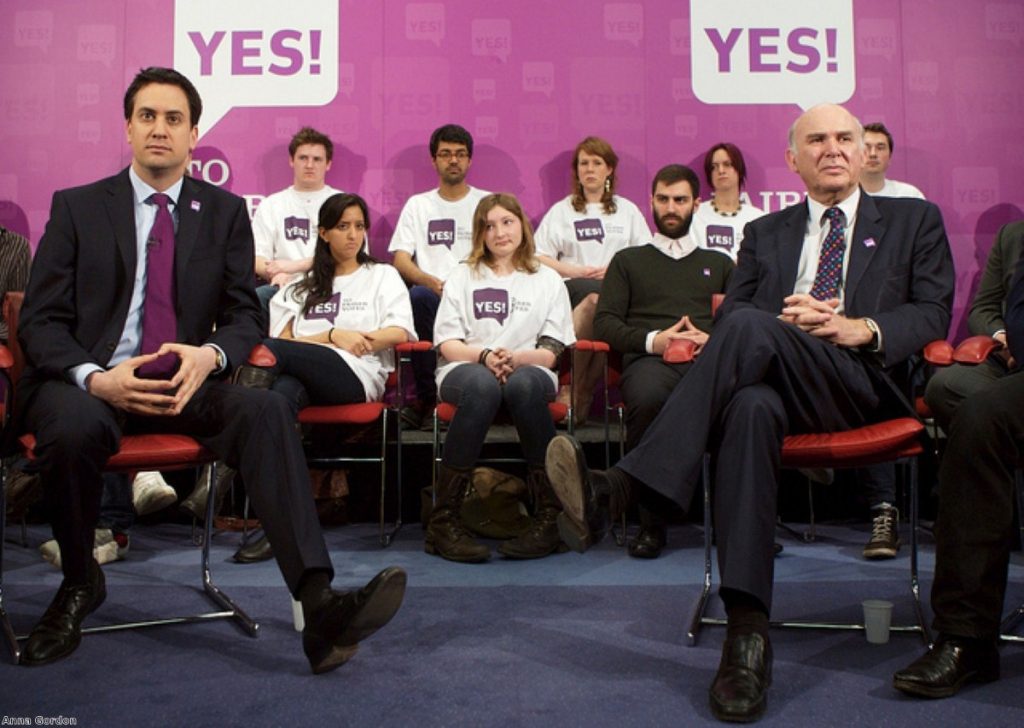Sketch: Cable and Miliband, together at last
The leader of the opposition made the case for the alternative vote with his usual passion and vigour. Ed Miliband wasn’t bad, either.
This was always going to be an odd occasion. The atmosphere seemed rather tense as the photographers waited for the big entry, listening to a cover version of Radiohead’s Climbing Up The Walls in an uncomfortably crowded room. Large red comfy chairs, that big purple ‘yes’ logo and a gaggle of t-shirted supporters as a human backdrop. The ‘yes’ event reminded one television journalist of a Jeremy Kyle set. There were to be no tear-stained real-life family melodrama on show today, however. This was not a Cabinet meeting.
Instead we faced the bizarre prospect of the business secretary and the leader of the opposition campaigning together against the prime minister.


This is coalition Britain, which makes anything possible. Including the sight of Ed Miliband striding in to the room closely followed by Vince Cable, the man who only last week said David Cameron had given a “very unwise” immigration speech, doing his celebrated impression of a mole whose tunnel has unexpectedly emerged in the middle of the M25.
Miliband – wearing a tie that exactly matched the purple colour of the backdrop behind him – seemed nervous, initially, as all the attention focused on the man of the moment. Why did no one want to ask the leader of the opposition any questions? He jumped in after an intervention from the Green party’s representative, who is presumably more used to being ignored.
He was intent on upping the rhetoric stakes, a dangerous habit which he must take care does not develop into an addiction. This referendum about which complex system we use to decide who gets to run the country. It is not about civil rights, or nuclear weapons, or Apartheid. Still, Miliband told us the referendum campaign had turned into one of “hope versus fear”. The yes campaign, reeling in the face of the ‘no’ camp’s ridiculous funding allegations, are certainly fearful, that’s for sure.
Having completed his daily hyperbole quota, Miliband seemed to cheer up. He kept grinning, as if he couldn’t stop laughing internally at a joke someone had told him just before walking on. Were these inner thoughts some sort of glee at Cable’s appearance which could not remain hidden? Or was he simply aware that there was very little downside for him in today’s appearance? His moment of greatest smugness came when asked whether he would or would not be happy to share a platform on AV with Nick Clegg. “I will share a platform with anyone I think can help win the referendum,” he said. It was hard to tell whether a smile was flickering over Cable’s naturally benign expression.
The business secretary wanted to talk about why the alternative vote is a good idea, but all everyone wanted to ask him about was whether he was about to walk away from the coalition for good. This did not impress Billy Hayes, leader of the Communication Workers’ Union, who attacked journalists for not seeing the “big picture”. Cable responded with the patient of the saint he once was. He made clear that he had no intention of quitting the Cabinet, that he had said what he had to say about immigration, and that electoral reform was nothing to do with partisan ideology.
Despite all this, it became painfully hard to believe when we were told that he feels “very comfortable” in the Cabinet. If I told my wife she was “very unwise”, the feeling at the breakfast table the following morning would be far from all smiles and goodwill.
(The coalition doesn’t like marriage metaphors, but Cable said relations were “professional” and “business-like”. Perhaps telling the chairman of the board that his policy was “very unwise” might be nearer the mark.)
It was certainly strange that Cable constantly drew attention to his links – and those of his party – with the left wing of British politics. He reminded this audience that he had stood as the SDP-Liberal party’s candidate in 1983 and 1987. And he pointed out that, in the interwar years, Labour and Liberal MPs had worked together to get the alternative vote passed through the Commons, before the attempt was scuppered by hereditary peers in the Lords. The ease with which he could fit in with the left was clear for all to see. All this talk of secretive Lib-Lab talks is baloney. Why speculate when the real thing was taking place right before our eyes?












